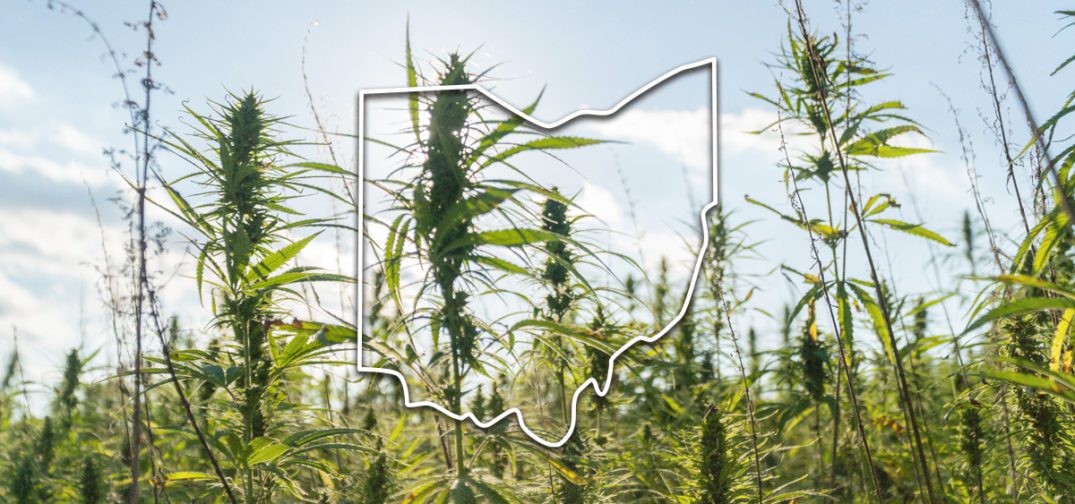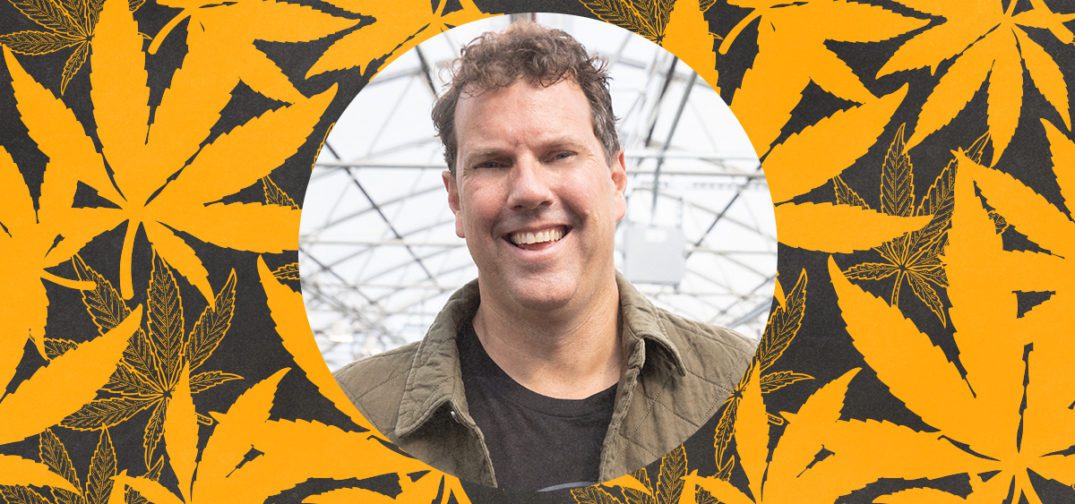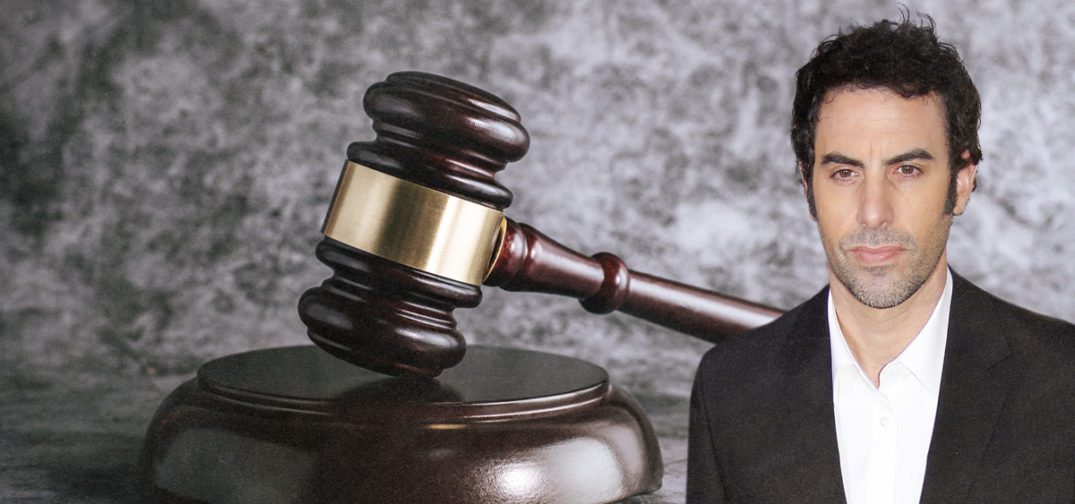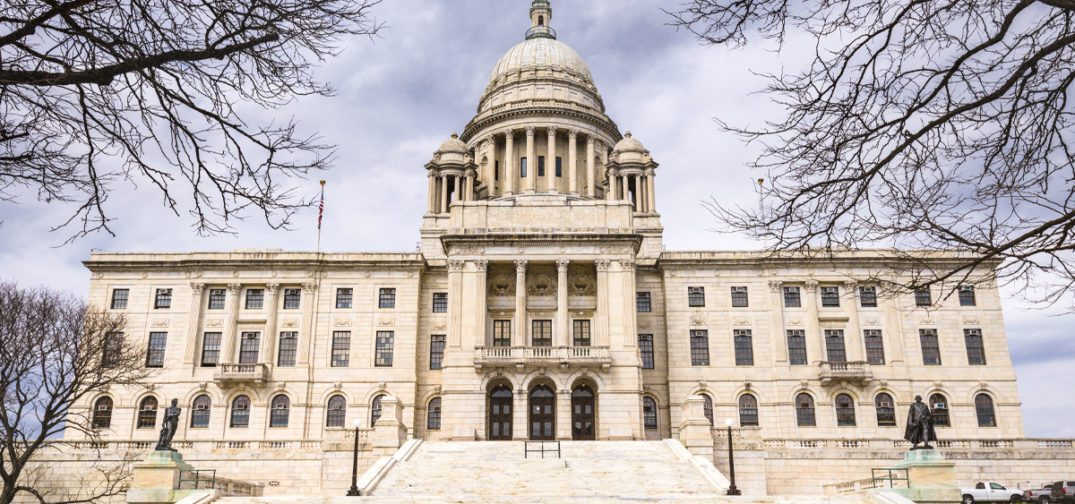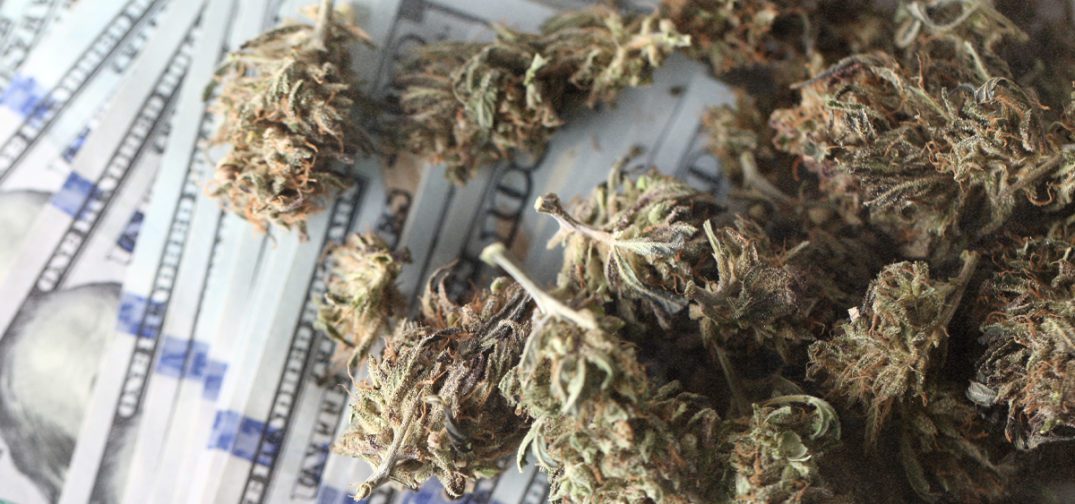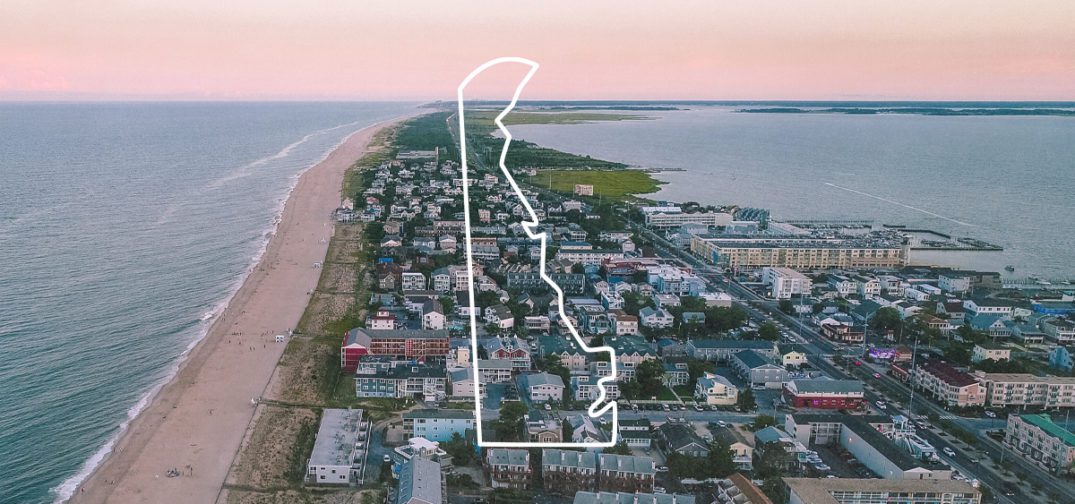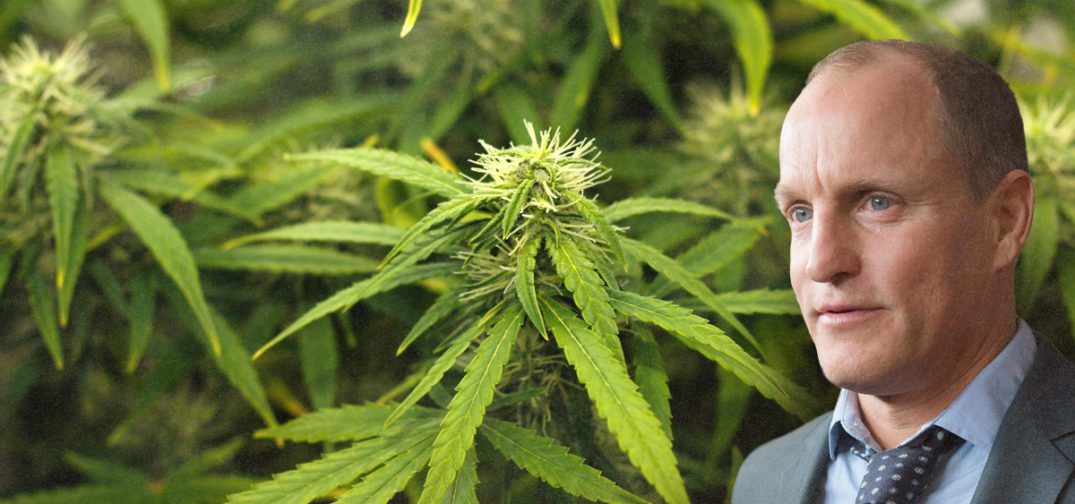From transitioning out of a self-described “boring” career in finance, to heading one of the East Coast’s biggest multistate operators to eventually moving to California to focus on team- and brand-building for Lowell Farms, few people have experience in the cannabis industry like George Allen.
In the latest Ganjapreneur.com Podcast interview, George and our host TG Branfalt discuss George’s exit from a Wall Street finance career to join the cannabis industry, his time as the President of Acreage Holdings (during which he approached the former Republican Speaker of the House John Boehner about endorsing the cannabis legalization movement), as well as the eventual transition from working for an MSO to joining up with the California-focused Lowell Farms. The interview also covers advice for building a strong team in the cannabis space, the differences between medical and recreational cannabis markets, the importance of being passionate about the industry, and more!
Listen to the podcast interview below or through your favorite podcast listening platform, or scroll further down to find a full transcript of the episode.
Listen to the podcast:
Read the transcript:
Commercial: This episode of The Ganjapreneur Podcast is made possible by AROYA, a comprehensive cannabis production platform for commercial growers. If you are a commercial cannabis grower, you can use AROYA to level up your production workflow. Featuring a combination of precision instruments and powerful software that help you intelligently cultivate, dry, and process cannabis, the AROYA cannabis production platform is your ticket to greater yields and consistent quality. Request a quote today online at aroya.io. That’s A-R-O-Y-A.io.
Cara Wietstock: Hi, I’m Cara Wietstock, culture editor at Ganjapreneur and host of our YouTube show, Fresh Cut. The best way to understand cannabis business is to speak directly to those who work within it. Fresh Cut was created to shine recognition on the people who fill these roles. In this interview series, we focus on those with their hands in the dirt, both literally and figuratively. From cultivators to bud tenders, educators to advocates, activists to lobbyists, we aim to illuminate the workers who keep this industry thriving. Enjoy one-on-one conversations with me and guests by watching along on the Ganjareneur YouTube channel and follow our social channels to keep up with the latest episodes. Have a great day.
TG Branfalt: Hey, there, I’m your host TG Branfalt. And thank you for listening to The Ganjapreneur.com Podcast where we try to bring you actionable information and normalized cannabis through the stories of ganjapreneurs, activists, and industry stakeholders. Today I’m joined by George Allen, he’s the chairman of the board for Lowell Farms, founder of cannabis industry investment firm, Geronimo Capital LLC, and former president for Acreage Holdings. Allen has been involved in multiple financing rounds, dozens of acquisitions, executive recruiting, and an initial public offering. How are you doing this afternoon, George?
George Allen: Hey, great. Thanks so much. I’m really grateful for the opportunity to talk to you today and really have enjoyed your podcast. So thanks for having me.
TG Branfalt: Thank you so much. You have done a lot in this industry, man. I’ve had a lot of guests on this show. I’ve been doing it since 2015. Somebody with your sort of breadth of knowledge, I’m really delighted to have you on. Before we get into sort of all these little things or big things that you have done, what is your background, man?
George Allen: I got to say it’s a little bit of a crime of fashion I got involved. I got involved in the industry after a pretty boring career in finance on Wall Street. I spent a lot of time, started out in finance and then moved into private equity. I did some fun stuff in software. I did a software roll up in a public company. And then more recently before getting into the industry, I ran a family office for a group of high network individuals in New York. And that’s when I first started getting exposed to cannabis because the family offices were the only investor group that was looking seriously at cannabis back only as short four, five years ago. And that’s when I started getting into it. I really saw the scale of the opportunity and how much blue sky there was. That’s what drew me in. And from there I was hooked.
TG Branfalt: So you described your life sort of before cannabis as boring and in finance. What are some of the biggest differences sort of culturally that you had to sort of deal with moving from something as boring as finance as you put it to the cannabis space?
George Allen: Well, I got to say the biggest challenge you’ve got in cannabis, there’s really two that I point to, but first is there’s no precedent for how to do things in cannabis right and how to do the med scale because it’s such a young industry. I don’t know that you’ve got a lot of precedent for that in other businesses where there’s a big industry that happens overnight but it has no analogs to it. And I think that’s the first challenge.
The second challenge that is just crazy is you just only have to walk 2 or 3 feet in this business before you find another stumbling block that is imposed by the federal policy in this business. That’s just super strange working with banks and trying to figure all that out, as well as employees and employment practices. There are a whole bunch of service providers that are available to most businesses that cannabis can’t avail themselves to. It’s a workable problem, but it takes clock cycles for sure.
TG Branfalt: Tell me about sort of the learning curve, right? I mean, you talked about these stumbling blocks. Maybe can you tell me about a specific instance sort of early on in your career that you had to sort of navigate through?
George Allen: Well, I’ll tell you, I’ll give you one that was kind of fun. Back in the early days at Acreage, the precedent of Acreage was a company called High Street Capital Partners then. It was very challenging to raise money. Back then Donald Trump had just been elected president. He put in a pretty anti-cannabis attorney general named Jeff Sessions. And Jeff Sessions had come out with a pretty militant view on cannabis. Raising money in that environment just to pay payroll was very challenging. I think it was about one year to Trump’s presidency where Jeff Sessions had come out and he pulled down a document called the Cole Memo. The Cole Memo had been some resting piece for cannabis entrepreneurs who were trying to make sure they weren’t going to jeopardize their career and their net worth by being involved in the industry.
And so, when he pulled down the Cole memo, it created a whole bunch of problems for everyone in the industry. That was actually when we first approached John Boehner about being on the board of a cannabis company, because I felt that you had to fight fire with fire. If Jeff Sessions was coming out arm swinging against cannabis, that we had to show the world that it was going to be okay to participate and invest in cannabis businesses.
It felt like we could do all the arm wave when we wanted to, but if we really wanted to punctuate that point, we had to bring somebody in that people knew and understood. Convincing Boehner to be on the board of a cannabis company was the best way we felt to do it. That was a fun conversation trying to get John to do it. But it really did save our schemes back then at the company, because it had made it a lot easier. In the wake of making that announcement and going on Good Morning America and doing all those stuff we did, it really did make it a heck a lot easier to get financing for a cannabis company.
And so that’s just one of the many stories we’ve had fighting this fight. In a lot of respect, it’s made the businesses better. It’s made the business a better because we’ve all watched what’s happened in Canada and the excess cause by capital euphoria that we haven’t seen that kind of capital euphoria in the United States. I think that’s made it harder, but it’s definitely made the businesses healthier and the industry healthier.
TG Branfalt: I just want to go back to a minute. This John Boehner thing, I wrote that when that broke. It was a big story at that time. I don’t know how much detail you can give me, but can you just tell me what was his reaction when you approached him with this?
George Allen: Actually to be honest with you, he was leaning pretty heavily in favor of it. He’d been trying to figure out his position on reconsidering where it was, where he wanted to come out on it, because he saw the shift. I mean, John has always been… He’s always been a center-driven Republican. I don’t think you can be Speaker of the House without doing that. And so I think he saw the writing on the wall, saw the shift, saw 64% of Americans in favor of legalization one form or the other. But largely, I think that there are many aspects that they convinced him to do it. There was the veteran angle and how much relief it was bringing veterans who were desperately in need of some relief from PTSD, from just a horrific amount of PTSD haunting our veterans, to the opioid epidemic and how much relief cannabis could pose for the opioid epidemic.
So it was a series of discussions that we had sitting down with John and walking him through the data and walking him through where he felt there was sufficient science and sufficient sort of public support. And eventually he said, “Yeah, I’ll lend my name to this cause and this in this journey.” It was a ton of fun. I’ve never experienced anything like it in my career and it was really exciting.
TG Branfalt: And I think to your point, it did help sort of change some of the rank and file more centrist, sort of maybe not the people in Congress, but certainly people that I know that are older than me that are sort of your moderate Republican. I think that changed their thinking a bit to see sort of one of their own somebody that they admire and in some respects enter the space.
You’ve been in this industry since 2017, which to a lot of people doesn’t seem like that long. I mean, if you think about it. But I mean for the cannabis industry, it’s a lifetime if we just sort of look at what’s happened with legalization since 2017, how many states have gone online through the legislative process, that sort of thing. Can you tell me how the industry in your estimation has changed since your entree into it?
George Allen: Yeah, that’s a great question. And it’s not that long. It’s not that long. There are people who have been doing this for a long time. And frankly, our success has really been on the backs of people who have fought a much harder fight for a much longer period of time. But you’re correct in saying the industry’s also shifted a lot, because acceptance has changed. I think there’s a couple things that are really going on in the industry that I find sort of investible trends. I think the first is, if you really look at what was going on cannabis, medical was the sort of the horse that everyone rode in on, right? It made a ton of sense. There’s a ton of injustice around the medical side. It made a ton of sense to wrap ourselves in the medical story originally because it really exposed the hypocrisy and the insensitivity that 75 years of terrible policy had implemented.
But I think we’re past the medical story now. I really do. And I think the consumer adoption and consumer acceptance is really migrating across the country where there’s much more willingness to be open to trying cannabis, there’s much more willingness to accepting the fact that cannabis can be a part of somebody else’s life even if it’s not only part of your life. I think that changes behavior patterns in a way that is something that we, as as a service provider in the industry, we need to pay attention to.
One trend that I find really particularly interesting is that smokable flower in California is the fastest growing category by dollars in California. And that’s really interesting. What’s interesting about that is I believe it’s telling you that the consumer is moving from formats that we’re really good at hiding cannabis consumption to moving to formats that are no longer concerned about hiding cannabis consumption. And I think that’s super enlightening. I think the raw plant here is put by far the most interesting form factor for consumers. It offers a ton of variety selection and choice, which a recreational consumer cares a lot about, right? But if you listen to an MSO, most of the time they’re going to talk a ton about consistency, right?
Consistency is a great sort of end objective if what your business is medicine. But consistency isn’t necessarily what you’re looking for in consumer offering of recreational cannabis, because recreational cannabis consumers, they love the journey, right? They love sampling different products and different strains and different plants. They’re not loyal to one stream, right? If you’ve got chronic back pain and you found the stream that’s going to relieve you from back pain, then you’re very likely to be loyal to that. But in recreational cannabis, which is I believe the more exciting and larger market, we don’t pray to the same God of consistency. What you pray to is quality, right? You need to have the quality in the product offering that consumers want.
That’s something that I’ve really learned from coming out here to California and sort of skinning my knee on the market out here, because it’s a market where consumers have a couple thousand choices of SKUs than a typical dispensary. If you go into a New York MSO dispensary, you might see 12 SKUs on the menu. And so you’ve got to go to the place where consumers have several thousand options to really understand what they’re looking for and what they want.
TG Branfalt: I mean, and to your point too, I think that we’re starting to realize also that people who have been using recreationally their entire lives, a lot of times are actually using medically. I don’t think it’s wrong to say that just because something makes you feel good, I believe that’s a sort of medical purpose.
George Allen: No, I couldn’t agree more. I couldn’t agree more. By the way, I don’t think it is right for any of us to judge why people use it. I think that it’s no different than any time in the past. Everybody is responsible for their own individual behavior. But the choice of how you recreate, I think that’s something we’ve shown the science behind cannabis. The social costs relative to the social benefit is profoundly in favor of normalization, so I’m right there with you.
TG Branfalt: You spoke a little bit about MSOs, which we’re talking about multi-state operators. You’d mentioned earlier there’s a lot of people who have been in this industry a lot longer than I have, you have. And so one of the things that I see quite a lot is a lot of blowback against the multi-state operator. I mean, here in New York we have that monopoly system and there’s a lot of sort of progressive stuff that was in the bill. I mean, we can smoke anywhere we can smoke cigarettes, which is pretty fantastic. But I think a lot of the sort of, let’s say stoner community at large, has a problem with a lot of these big companies coming in. They take over. Not to say that it’s a green goop kind of takeover of what’s going on. But I got to ask you, what role should multi-state operators have in the cannabis space?
George Allen: Well, boy, I could talk a long, long line for that. I’ve been on both sides of the fence, right? I ran a multi-state operator for quite some time and then I decided to head out to California and focus on California because I really wanted to build a brand and understand where the consumer was going.
Now, if you really want to deconstruct what the multi-state operator’s all about, it’s really at its essence these limited concession rights that almost like gambling casinos the states have given out. The premise originally was that cannabis has just an enormous amount of social danger to it. You got to be very careful about how much wildfire you start with cannabis. So the idea was to keep it very narrow and contained because with 10 operators, a regulator can guarantee that he knows where every throat to choke is if something goes wrong, right?
TG Branfalt: Gotcha.
George Allen: And I think that was originally the premise here of how they started with these limited license concessions. The reality is though, I think we’ve seen where the social cost and where the risk is in cannabis. I think that experiment is showing us that there’s less inherent risk here in having more of an open market approach to cannabis. Now, I know that’s not popular because that has a major impact on margins and that has a major impact on pricing in the marketplace. But that’s probably why you hear from so many consumers that it’s frustrating, because as I said, it’s not that interesting to go into a dispensary where you got 12 options like the MedMen store on Madison Avenue. That’s kind of boring relative to the MedMen store that’s located on North Hollywood. So in my opinion, the market sort of learning it… And there was never any promise to the MSO model that these concessions were going to be enduring forever. No single statute does it prohibit the state from issuing more licenses over a period of time. And so I think what you’re going to see is a more open market approach.
I also take the point of view that the federal government when they legalize or they decriminalize the product, you’re going to see more of an open market approach here regardless of how the individual states behave, because consumers aren’t going to wait for state by state permission to enjoy the cannabis that they want when the federal government decriminalizes this. So I think in a lot of respects, the states are going to lose a fair amount of strength and negotiating leverage at the table as the market matures here and decriminalization happens in Washington.
TG Branfalt: That’s a super insightful sort of response, especially from you being on both sides of it. You had said that you had shifted your focus to California. And so I want to ask you a couple questions about California is, what have you found that a company has to do in that state to reach success? Because it’s so competitive. And then not just reach that success, but maintain that success.
George Allen: Yeah. It’s all people. It’s all 100% people. You need to have a great team. That doesn’t necessarily mean have like IEP between the ears of a grower who’s a “master” grower. It means people that are willing to really shed blood for the business. I mean, it takes that type of dedication in a competitive industry like this where there’s so many people that get into the business because of passion but don’t necessarily have the execution skills or the business skills to succeed. But you have a constant flow of people that thinking they can. And defending against that in California requires that you build a really, really solid team that can fit, can work cohesively together because there’s no way that one single individual can do it on its own. It’s just too competitive of a market and too large of an opportunity. So I’m very focused on team recruiting, building culture, keeping with working on retention. There’s a ton of other aspects that sort of make up California, but if you don’t have the right people, you’re not even checking into to the airport with a ticket.
TG Branfalt: And so what are some of the challenges when recruiting the sort of high level executives that you need to sort of help lead that team? What attributes do you look for when recruiting high level positions?
George Allen: I think it’s hard. I wouldn’t say that there’s attributes. A lot of people early on thought cannabis looked like alcohol, so let’s look for alcohol. A lot of people think it looks like CPG, so let’s look for CPG. I don’t think that there are attributes from a sort of like a resume standpoint. What I do think is desire and passion and ability to really commit themselves to a goal and a vision. I think that’s something that we look for. It’s hard to look for as a screening process, but you can find out pretty fast after the fact. I also think, from my standpoint, it’s very hard for people who don’t have any experience with the plant, although we’ve got a number of extremely talented people on our team who play roles in the organization who don’t have a personal relationship or the plan.
And so I’m constantly surprised by that, but in lot of respects, I think what motivates them isn’t necessarily their loyalty to the all the green goodness that’s inside a cannabis plant, but rather their loyalty or the thing that drives them is the excitement around building and creating. That’s an opportunity that you get in cannabis. Cannabis is more of a blank canvas then you tend to get in other industries, and that’s been really exciting. So some people respond to that really well and some people respond to it as, “Wait a minute. You mean there’s no building plan or there’s no roll out plan that I can just look to and implement?” But rather we have to be creative and create it ourselves. And that’s right for certain people and not right for others.
TG Branfalt: I mean, I’m sure that you find yourself in situations where you’re looking at resumes or recruiting people who don’t have that experience, that background in cannabis. What businesses in industries do you see a lot of sort of people you recruit or that or that apply to you come from?
George Allen: So a lot of it’s geographic, like where are you? We’re in Monterey, which is in one of the most prolific areas in the country for growing, so growing anything from leafy vegetables to tomatoes. You tend to see a lot of people come from agriculture who are interested both back office as well as out in the field who are interested. In a lot of respects, cannabis is pretty interesting in that some people are just bitten by the bug in one form or another. And just by virtue of the fact that they submitted their resume is enough of an indication that they’re curious and they’re committed to learning about a new industry. And I think in a fair amount of respect as I said before, there isn’t necessarily like a ministry that we say, “Hey, we want to recruit everybody from this CPG or beer or liquor space,” but rather it’s more about their individual story and what they’re seeking and what motivates them.
TG Branfalt: So I want to switch gears a little bit and talk to just about some financing stuff. You’ve done an IPO, which again in the cannabis space is not super common. What are some of the challenges for doing an initial public offering in this space? How does it differ from more traditional industries?
George Allen: Well, I think a couple of things. Not to be overly technical about it, but what we did at Acreage was a reverse public takeover. So we basically merged into an existing shell. In a lot of respects, there’s many parts of it that are similar to an IPO, but technically speaking it RPO. I actually don’t think the differences between cannabis and other industries really exist, but I think I’m in the minority there. I think you actually need to communicate your story to investors with the same amount of clarity and transparency and honesty that other businesses hold themselves accountable to, or other successful ones do. And if you’re not going to do that, but rather you’re going to expect that investors are more tolerant or more lenient with sort of grievances so to speak than they would be with a mainstream industry, eventually you’re going to get burned.
The self-correcting mechanism that exists with investors is that management teams and owners, they’re the last guys who get paid. And so it’s not about how you start your journey. It’s about the full extent of your journey and where you end up. The mistake that many people make in cannabis is the journey’s over once you get the company public. That is just the very, very beginning. The promises that you make, people are going to remember those for a long period of time. Investors have a very long memory. Depending on where the cycle is and where capital markets are at the moment where you’re trying to go public, the amount of benefit that they’re willing to give you of the doubt changes. But that doesn’t really change how they’re going to look at you in arrears. They’re always going to hold you accountable for what you said and what you did.
TG Branfalt: And what, in your opinion, makes for a good company that can raise money? What do investors… You have a capital company. What attribute to a business do you see, and you say, “This is a good bet right here?”
George Allen: Well, the bet to get involved within this was really around the team and the infrastructure that they had. And I think it really changes situation by situation, but ultimately we’re looking for is the ability to build enterprise value over a long period of time. Enterprise value is a function of profitability times multiple. And so it’s really your perception of where those ingredients are sort of going to be harvested in the landscape. There’s one approach to just go and try to maximize profitability by going to a limited license marketplace and selling hotdogs inside the hotdog stadium for as high price as you can for as long as you can until the concession runs out. My challenge with that is I don’t think there’s a lot of terminal value there. I don’t think there’s much at the back end. Instead, we’re focused on building a brand that consumers embrace and associate with the use of recreational cannabis in a way that nobody has done before. And that’s where I see the highest enterprise value over the long term.
So I’m committed to that journey and that mission. I’ve communicated that to all my investors. I’m grateful to have an investing group behind us that knows what we’re trying to do and is extremely supportive. I think the fundamental pillar of maintaining a relationship with your investors is giving them transparency. It’s something that I think people miss out a lot. I think the perception is that investors only want to hear good news. What happens when investors only hear good news is their bullshit meter starts climbing and they know that no company is made up of only good news, and so they start to doubt it. And it’s only a matter of time before their doubts get proven accurate.
TG Branfalt: I mean, you have such an insight into… I mean, I didn’t go to business school, but the economy of scale and that sort of stuff. I mean, a lot of people I don’t think that I’ve spoke to anyway, don’t sort of take this really pragmatic approach and I really appreciate that. What advice-
George Allen: Well, it’s been a lot of fun. Yeah. Sorry, go ahead.
TG Branfalt: No, no. What advice would you have for entrepreneurs who are looking to enter this space either as an investor or a high-level executive looking to enter a sort of exciting space? What advice do you have for those people?
George Allen: Just get involved. The honest to God truth is, get involved in any way you can. Learn about the business in any way you can. What’s going to happen… Because if you’re looking from the outside, it’s hard to be constructive. In a lot of respects, this industry is so immature that it shocks a new entrance into it, is to how many corners of this sort of like this new world haven’t been explored. But you don’t even see that from the outside until you get involved. So find an opening. Take a job, take a role. It’s not going to be a role you’re going to be at forever, but get involved. If you can get involved in a leadership capacity, great. If you can get involved in an employee capacity, great. It doesn’t mean that’s where the journey ends, but certainly you got to start somewhere.
TG Branfalt: What excites you most about sort of the future of the industry?
George Allen: Wow, there’s so much to that question. There’s so much to that question. Truth be told, I see… Cannabis is really fascinating. It’s a product that for the most part delivers on its promise. There are very few products out there that do that. I think it’s really fun to be engaged in the industry like that. It’s also a challenge. It’s also a challenge to build a brand in an industry where pretty much all brands and all products at some level are delivering on their promise, right? There’s so many businesses out there that really fail to deliver on their fundamental promise. And when you look at those, then it’s easy to differentiate the ones that’ll be successful because they are delivering than the ones that won’t. But cannabis in the most part does deliver on its promise. And that’s a challenge, but also what makes it so exciting. How do you get through to consumers on a brand basis where the product itself does such a great job of delivering?
I personally think that there’s a huge opportunity here to capture at the moment where everybody goes from being somewhat discreet about cannabis consumption, to being more open and casual about cannabis consumption, to build a brand that is really sort of about that transition and about that moment in history, because I think that’s an indelible brand that will be around for a long, long time. And that’s what I believe we’re trying to build it Lowell.
TG Branfalt: I will say that when it comes to branding, I think that it’s especially hard for cannabis companies, because I mean I’ve been smoking cannabis every day since I was 16 years old and I’ve never had to rely on a company. I had to rely on my boy who I guess could be a brand. But I think it’s going to be really hard when we’re not used to even making those considerations for 30 years, 20 years.
George Allen: Yeah, I couldn’t agree more. And I think that’s going to change over time, how it’s going to change. As I said, it’s going to be more of a journey. The brand is going to be… It’s going to be really fun. For me, the reason why I get so excited about Lowell and the reason why I was so drawn to the brand from early days, it was one of the first brands that in my opinion gave permission to the consumer to show off cannabis to everybody.
TG Branfalt: Interesting.
George Allen: You know your experience with cannabis as a user, you understand that for you, you feel a certain way about cannabis. But what Lowell is about is telling you that the world is going to look at you as mainstream and normal and as beautiful as you feel about the product itself. And that’s really what I think Lowell does so well. It makes everybody accept cannabis in a way that you and I have accepted it for so long. And that’s not easy to do. And so that’s a starting point for what I think is a really great brand equity.
TG Branfalt: This has been a really fascinating conversation. Not exactly what I would’ve expected just because of your background. And I’m not saying that as a detriment. It just went in a different direction than I had thought, which is really excellent. Where can people find out more about you, more about Lowell Farms? Give us the socials and that sort of thing.
George Allen: Well, I would generally say if people are trying to find out more about me, they’d be real bored. But I’d definitely point them to Lowell Farms. We’re on all of the major social media platforms. We got one of the largest footprints on Instagram in the industry. We’ve got a lot planned for the near future and super excited to keep moving forward. The way I view it is everything that we can do for Lowell, we’re going to do as well for the cannabis industry and for people who’ve been working real hard on this promise for a long time. I think we’re a good mouthpiece for it. We’ve got a great team that’s dedicated to the mission. We have lowellfarms.com. It’s got all the goodness around our financial reporting, which is fundamental to any investment decision. I think it’s all out there. And I look forward to talking to investors. We’re grateful for anybody who’s interested in either employee or investing in the business. We always love to hear from you.
TG Branfalt: Thank you so much. That’s George Allen. He’s the chairman of the board for Lowell Farms. He’s also the founder of cannabis industry investment firm, Geronimmo Capital LLC. Thanks again, George. I hope to hear from you soon and maybe we’ll see you out here in New York in a year and a half.
George Allen: We’ll be there. You can count on. Looking forward to it.
TG Branfalt: You can find more episodes at the Ganjapreneur.com Podcast in the podcast section of Ganjapreneur.com on Spotify and in the Apple iTunes store. On the Ganjapreneur.com website, you’ll find the latest cannabis news and cannabis jobs updated daily along with transcripts of this podcast. You can also download the ganjapreneur.com app in iTunes and Google Play. This episode was engineered by Trim Media House. And after what? Seven years of being the host of the Ganjapreneur.com Podcast, I am moving on to Cannabias where I will be helping to demystify some media bias coverage in the cannabis industry pertaining to the cannabis industry. Thank you so much for listening to me, rattle on for these seven wonderful years. I have been your host, TG Branfalt.


